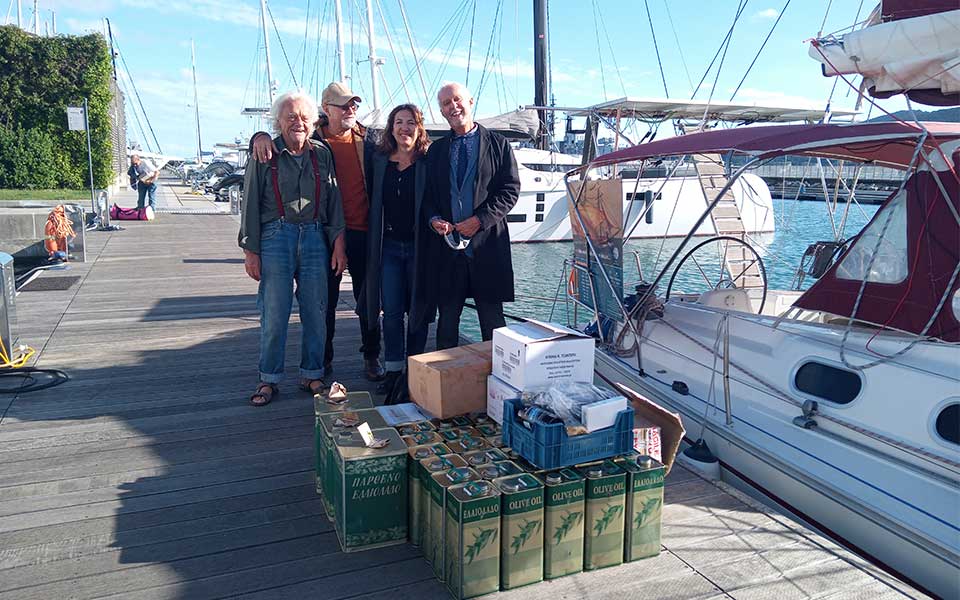If one were to choose only a few words to sum Aegean Cargo Sailing, they would be: renewable energy, commercial sailing, sustainability, ecology, love for the sea, philhellenism.
As for the man behind the venture, that would be Loucas Gourtsoyannis.
“Kyrie Louca,” as his crews call him, studied at the National Technical University of Athens and obtained a PhD in metallurgy at McGill University in Montreal; he headed the Society for Industrial Research and the Technological Development of Metals (EVETAM) in Volos, Greece, for eight years; and he lived for 20 years in Brussels, where worked as a business consultant and was the director of the European Office of Crafts, Trades and Small and Medium-Sized Enterprises for Standardization (NORMAPME).
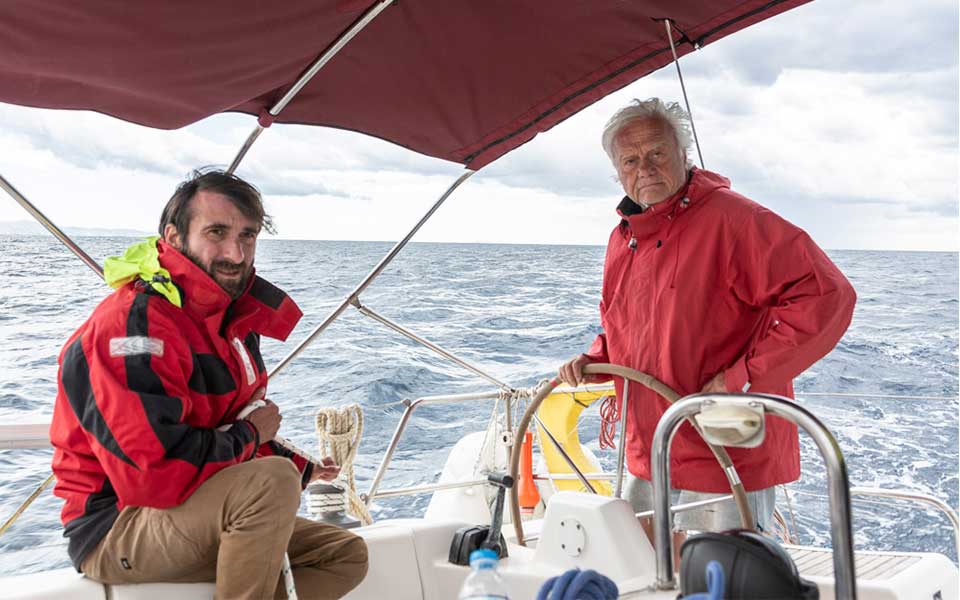
At the age of 54, he took his first voyage on a sailboat and, as he describes it, “felt the happiness of a free life.” At the age of 60 he returned permanently to Greece, having made the decision to live on the water.
In 2017, aware of the need to protect the environment and Greece’s natural beauty, he embarked on his first Aegean Cargo Sailing expedition and discovered his true calling. In his own words: “I was enchanted and bound by the dozens of new acquaintances and friendships I made with people who believe in [the undertaking]. This adventure fulfils the need to overcome my fears of sailing in difficult seas, organizing teams and planning for the future. All this creates the conditions for active happiness. I hope to see the new generation take the reins for the continuation of the undertaking.”
The project seeks to provide concrete proof that in modern times the use of diesel-powered vessels for the maritime shipping of goods can be reduced – if not completely done away with – and transport can once again be powered by the wind.
Aegean Cargo Sailing combines the transport of high quality products to, from and between the Greek islands with ecological tourism. It involves people who are environmentally minded and who have a love for the sea and for Greece, transporting Greek products using sailboats that do not pollute the environment.
They are joined by people who want to spend their summer vacations at sea on a sailboat. They work as crew on Aegean Cargo Sailing sailboats, experiencing authentic nautical tourism, and discovering the country’s islands.
But Gourtsoyannis – whose profound love for and belief in what he does is itself a source of inspiration – explained it to us better:
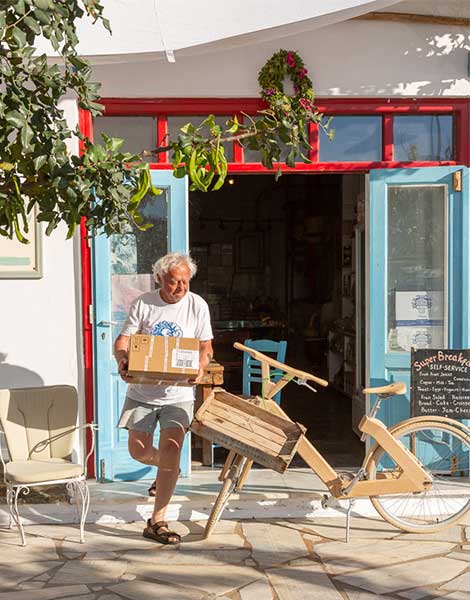
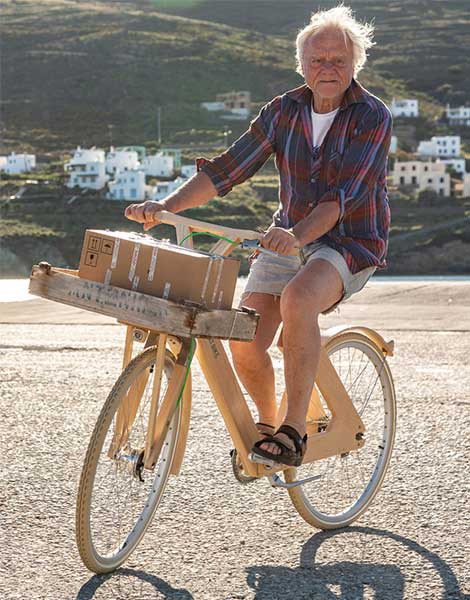
How did you decide to leave it all behind and live at sea?
As a child I longed to have my own boat. My studies, career and raising my own children did not allow me to do that. Only when my children became independent did I get the opportunity to try sailing for the first time at the age of 54. I discovered that it suited me – I felt like a born sailor – and for six years I traveled to Greece twice a year and rented a boat for a week. Meeting sailors from all over the world who lived on their boats at sea all year, I decided that that was what I wanted to do at some point. So since 2010 I have lived on Pelago, which I modified for winter living.
The constant changes in the landscape, the wind and sea, the stars at night, the clouds, the sky, the dawn and the sunset, the mountains and the smells of the earth that reach the boat, the sound of the waves and the birds, the bleating of goats and their bells, even the breath of the dolphins are incomparable sources of joy, and I live with them every day. To top it all, the maintenance of the boat requires you to be with a screwdriver in hand at all times, which is another source of joy.
Have you ever been scared at sea?
The first time I did the Andros-Tinos route, I started late, not knowing how strong the downhill katabatic winds are near the mountains of the two islands. The boat was tilting too much and wouldn’t obey me at all. It was the only time I was afraid I would hit the rocks and be done for.
I managed to avoid that fate but I spent the whole night wrestling with the tiller until I dropped anchor outside the port of Tinos to sleep for a few hours. Only this year did I learn the correct distance to keep from Tinos and Syros, in order to take advantage of the winds coming down the hills instead of them mistreating me.
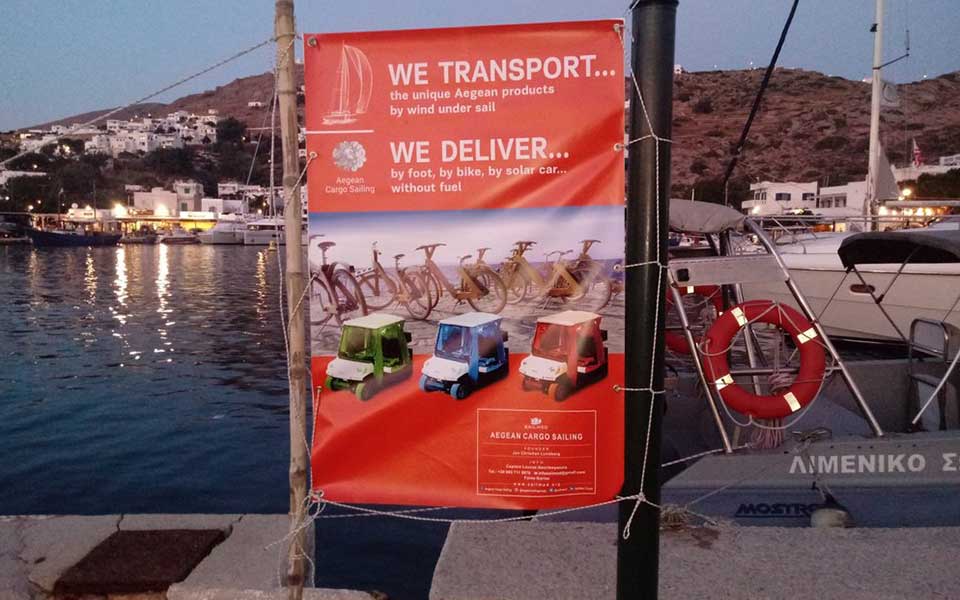
How did Aegean Cargo Sailing start?
The philhellene Jan Lundberg started the effort in Greece with a small team seven years ago. In 2017, the first trip round six islands (Kea, Andros, Tinos, Mykonos, Ikaria, Samos) took place, during which we contacted producers of ecological and traditional products in order to transport them to stores on the islands and in Athens.
Since then the group has changed and many new members have been added. Today, producers from the islands, traders, professional and amateur sailors, journalists, photographers, film directors, donors and environmental friends cooperate with the group. We are also supported by the Ministry of Tourism, the Cyclades Chamber, and many island municipalities, companies and associations.
The most fundamental principle of the whole project is the protection of the environment. Can you tell me a little bit about that side?
Without fuel, pollution of the sea is reduced and the biorhythm changes, bringing it closer to human nature. In addition, the “mild” tourism we propose reduces the need for buildings and paving. Both individually and as an organization we participate in cleaning land and sea of plastics and waste. We have also collaborated with the NGO Archipelagos to record dolphins and marine life and we aim to do this systematically. Finally, I consider our cooperation with the Slow Food organization very productive.
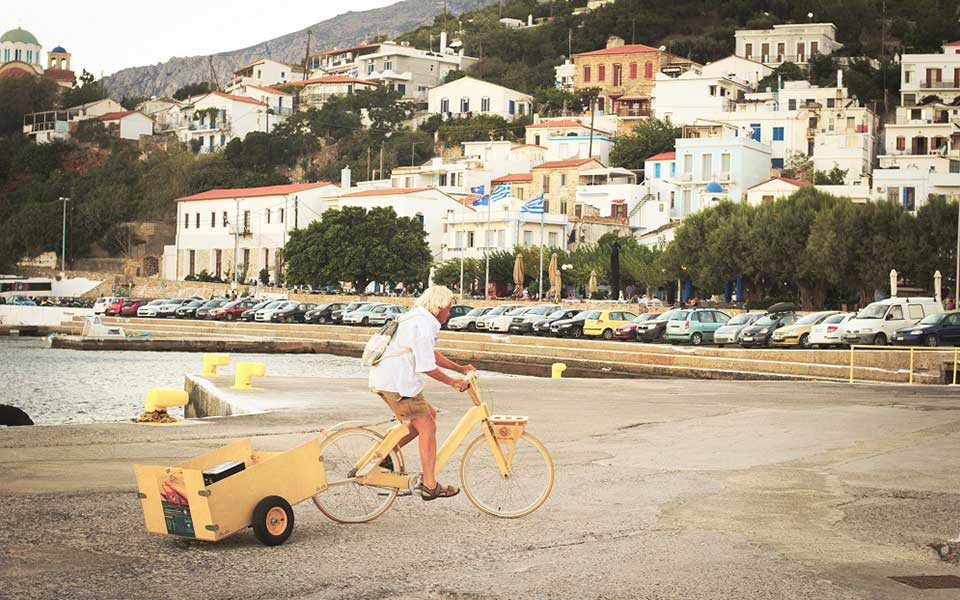
© Marine LeDuc
But equally important is the love of Greece, through its products, that you transport to other countries and the tourist experience you offer.
Greece has natural beauty, a unique biodiversity and culture that you do not find anywhere else. By giving tourists the opportunity to discover the sea and our islands, we offer the best possible perspective of our country. On the other hand, promoting unique Greek products in Europe, and maybe even further, which we are just starting to organize systematically, is the second way that we proudly present Greece.
Both dimensions are constantly evolving. This year, despite the problems, we had the first thematic tourism groups visiting our islands and three different product shipments to Europe. We are negotiating much more for 2021.
Do you think it would be possible for the distribution of Greek products in bulk to work in this environmentally friendly way? Or are we talking about symbolic actions?
Today we are in the first experimental stage of product handling with relatively small boats. The increase in demand that we are seeing will be met in the second stage, with more boats, more destinations and better organization. Fuel costs are zero and refrigeration is powered by photovoltaics. In the third stage, larger vessels will be required, such as those already in the Atlantic. In the Mediterranean we are still the only cargo sailing organization.
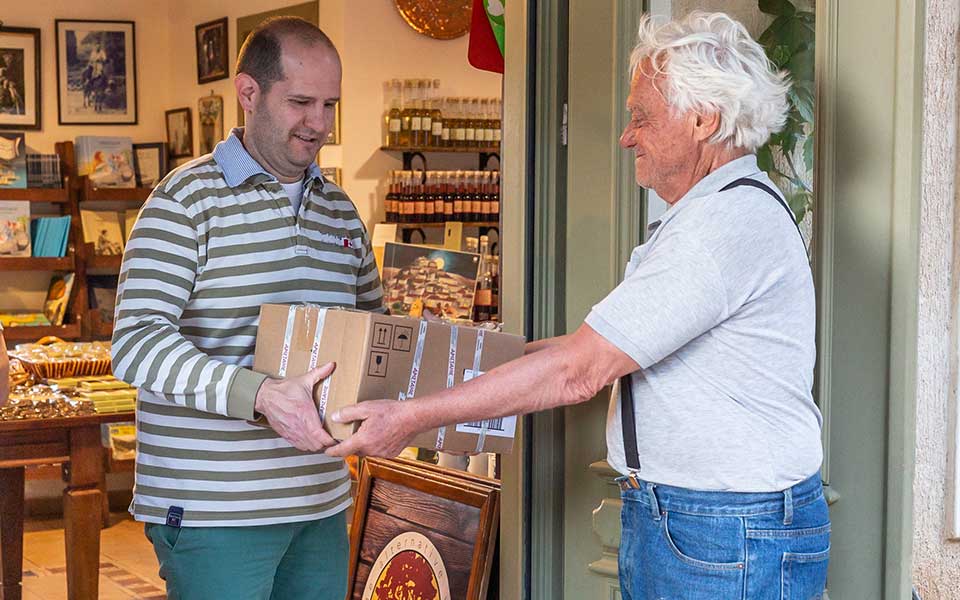
Are there domestic producers who prefer to ship their products via Aegean Cargo Sailing? What do they tell you? What do they make of the whole project?
There are dozens of producers who enthusiastically send their products out under our sails, on the one hand because they are ecologically minded, and on the other because they believe that our distinctive mark “Transported by Sail and the Wind” adds value to their products.
What is your message?
Transport your products by sail, travel by sailboat and boost the blue economy to save the planet.
What is your big dream for Aegean Cargo Sailing?
To contribute to the elimination of the oil economy in order to avoid further destruction of the environment with monstrous investments. I hope to live to see the beginning of this change.
This interview was first published in Greek in Kathimerini’s Sunday magazine K.

